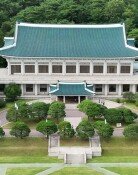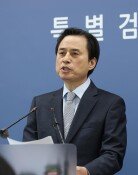`Economic growth focus to shift toward balanced development`
`Economic growth focus to shift toward balanced development`
Posted February. 22, 2013 07:31,
The focus of economic growth will change from quantitative growth centered on conglomerates to a balanced growth centered on the peoples livelihood, according to the presidential transition committee on Thursday.
The committee said that Korea has put economic growth before social welfare but the incoming government will create a "virtuous cycle" between economic growth and social welfare. As President-elect Park Geun-hye has replaced the term economic democratization, a major campaign pledge, with principle-centered market economy, the level of reform is expected to be lower.
Among specific tasks for the economy, committees for tax reform and a "grand compromise of the people" will be set up this year to induce agreement on the extent and methods of tax hikes to implement welfare pledges. To maintain fiscal soundness, an integrated financial risk index will be created while restructuring the make-up of the government budget through a committee for a forthcoming fiscal restructuring.
As a result of these changes, the number of tax-exempt items will likely be reduced or adjusted and taxes are likely to increase.
The government will complement foreign exchange regulations to have inflation stay stable in the 2-percent range and prevent volatility in foreign exchange rates. To this end, the distribution system of agricultural products will be improved, the number of cheap gas stations will be increased, and competition to lower communication fees will be fostered.
To stabilize foreign exchange rates, the new administration will adjust rates and levy methods of existing systems, including those of futures exchange position and foreign exchange soundness, instead of adding more regulations. Excessive regulations for the housing market that were introduced amid an overheated market will be lifted to stimulate transactions.
Most pledges on economic democratization will be carried out, including a ban on subsidiaries of conglomerates from making new cross-unity equity investments and introducing regulations to prevent the owner families of business groups from taking personal benefits through the companies.
On the criticism of scaling back economic democratization, Saenuri Party Rep. Ryu Seong-gul, assistant administrator of the first economic division of the presidential transition team, said, We haven`t lost our determination just because the term was changed. All the pledges are reflected in the details of the national agenda items."
A variety of measures will also be promoted to create jobs for young people and strengthen their communication with the government. An evaluation index of job-creation competitiveness of the top 100 businesses, public institutes and municipal and provincial entities will be produced twice a year and the scope will be expanded.
For young jobseekers, an offline center named Ggumteo will open in college towns and Seouls posh district of Gangnam to provide counseling, meeting places and cafes. Ggumteul is an online version of Ggumteo, which will be run on the Internet and social media.
To help young Koreans get hired overseas, specific plans have been set up under the name K-MOVE. The government will integrate the project "Global Young Leader," which has been operated by seven government ministries and agencies, under the K-MOVE headquarters. K-MOVE centers and schools will be set up at embassies and government education facilities to promote youth employment more systematically.
january@donga.com



![돈 뺏어간 96%가 자식·요양사·지인… ‘양자’ 신고해 상속 노리기도[히어로콘텐츠/헌트②-下]](https://dimg.donga.com/c/138/175/90/1/wps/NEWS/IMAGE/2025/12/15/132967464.1.jpg)


